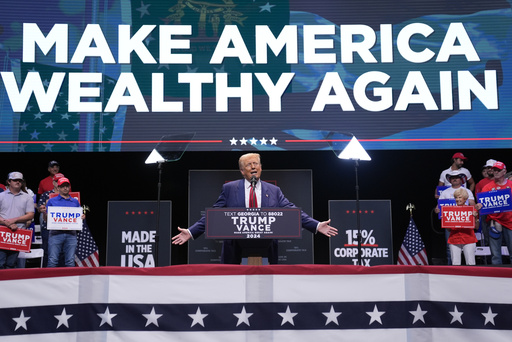Donald Trump has put forward a plan to eliminate taxes on tips, Social Security, overtime pay, and more if he were to win re-election to the presidency. However, he has not provided specific details on how he intends to finance these proposals without causing a significant budget deficit. Trump’s argument revolves around the notion that his policies would spark an economic boom, ultimately benefitting Americans financially and improving the country’s overall economic landscape.
The forthcoming congressional debate over the tax code is expected to be a central legislative issue next year, especially given the impending expiration of the tax cuts Trump enacted in 2017. If Trump secures a second term, he could push for the implementation of his tax-related ideas, but this could prove challenging if the Democrats gain control of either the House or the Senate.
Various estimates from external economic analyses indicate that the costs of Trump’s proposed tax cuts could range from nearly $6 trillion to $10 trillion over a decade, depending on which policies are adopted and how they are executed.
One of Trump’s key tax-related ideas is to exempt workers’ tips from federal taxes, a pledge he announced in June. This proposal, inspired by a waitress at his Las Vegas hotel, aims to benefit individuals in service industries who rely on tips for a substantial portion of their income. Trump has not specified whether this exemption would apply only to income taxes or to the payroll tax that funds programs like Medicare and Social Security.
Another plan Trump has endorsed is cutting taxes on Social Security for older Americans. While this may sound appealing, critics argue that such cuts could jeopardize the financial stability of the Social Security program. Additionally, Trump has expressed support for eliminating taxes on overtime pay, citing the potential benefits for workers and companies alike.
In terms of corporate tax rates, Trump has proposed reducing the rate from 21% to 15% for businesses that manufacture goods in the U.S. Conversely, Vice President Kamala Harris advocates for higher taxes on big corporations and the wealthy, aiming to utilize the revenue to support initiatives like affordable housing and tax breaks for parents.
Trump has also promised to address the State and Local Tax (SALT) deduction cap, a move that could have significant implications for residents in high-tax states. On the subject of tariffs, Trump has advocated for higher tariffs on imported goods as a means to incentivize domestic production, despite concerns among some economists about the potential impact on consumer prices.
The debate over tax policies and their implications for the economy and individual taxpayers is expected to be a focal point leading up to the next presidential election, with contrasting visions from Trump and Harris on how best to approach taxation in the United States.


